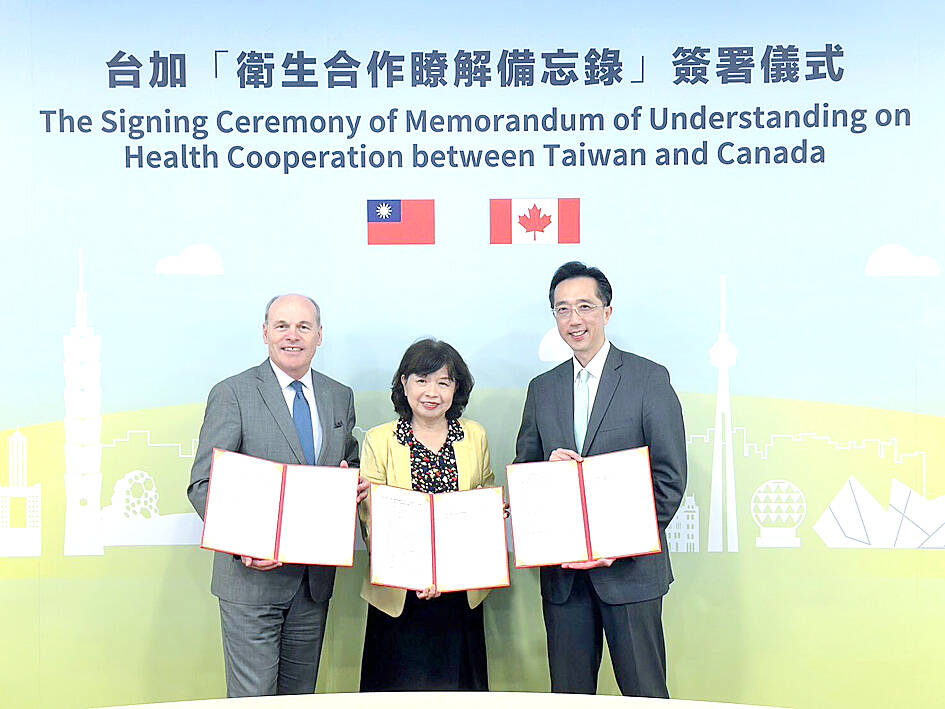Taiwan and Canada signed a memorandum of understanding (MOU) to promote cooperation on health affairs and boost the efficiency of joint programs, the Ministry of Foreign Affairs said yesterday.
Representative to Canada Harry Tseng (曾厚仁) and Canadian Trade Office in Taipei Executive Director Jim Nickel signed the MOU on Health Cooperation between Taiwan and Canada via videoconference on Tuesday, the ministry said in a statement.
With the MOU, the two sides can facilitate cooperation and enhance resilience in response to public health incidents, North American Affairs Department Director-General Douglas Hsu (徐佑典) told a news conference yesterday.

Photo courtesy of the Canadian Trade Office in Taipei
It is the first time that the two countries have established systematic cooperation in the field of public health, he said, adding that it is the result of cross-departmental efforts from both sides.
The MOU also demonstrated that Taiwan and Canada are taking concrete steps to bolster their partnership, he said.
Taiwan is confident in its ability to continue to make contributions to the world in the field of public health, he said.
Taiwan is looking forward to deepening cooperation with Canadian agencies to enhance the health and well-being of Taiwanese and Canadians, and the two countries’ common interests, he said.
Taiwan’s “soft power and warm power” continue to attract like-minded partners around the world to seek deeper and wider cooperation with the nation on not only public health, but also economy and trade, he said.
Hsu cited the example of British Columbia’s (BC) plan to establish a Trade and Investment Representative office in Taiwan to increase export and investment opportunities in the country.
The Canadian province announced the plan on Friday last week, identifying Taiwan as one of the “valuable new markets that BC will focus on for export growth,” along with Mexico and Vietnam.
The office “will be created to support BC businesses with better access to the market” as part of its new trade diversification strategy, the British Columbia Government said.
The priority cooperation fields include agricultural products, clean energy and technology, forestry, manufacturing, the information and communications industry, and biotechnology, Hsu said.
The announcement came after similar plans were implemented by Arizona and West Virginia, which opened representative offices in Taiwan in March and last month respectively, he said.
The US and Canada are adding resources to their programs in Taiwan, which proves that Taiwan has a good economic and trade environment, plays an important role in the global supply chain and is internationally competitive, he said.
The ministry welcomes Canadian provinces and US states seeking to set up offices in Taiwan, and encourages North American businesses to increase their investment in the nation, he added.

A Chinese aircraft carrier group entered Japan’s economic waters over the weekend, before exiting to conduct drills involving fighter jets, the Japanese Ministry of Defense said yesterday. The Liaoning aircraft carrier, two missile destroyers and one fast combat supply ship sailed about 300km southwest of Japan’s easternmost island of Minamitori on Saturday, a ministry statement said. It was the first time a Chinese aircraft carrier had entered that part of Japan’s exclusive economic zone (EEZ), a ministry spokesman said. “We think the Chinese military is trying to improve its operational capability and ability to conduct operations in distant areas,” the spokesman said. China’s growing

Nine retired generals from Taiwan, Japan and the US have been invited to participate in a tabletop exercise hosted by the Taipei School of Economics and Political Science Foundation tomorrow and Wednesday that simulates a potential Chinese invasion of Taiwan in 2030, the foundation said yesterday. The five retired Taiwanese generals would include retired admiral Lee Hsi-min (李喜明), joined by retired US Navy admiral Michael Mullen and former chief of staff of the Japan Self-Defense Forces general Shigeru Iwasaki, it said. The simulation aims to offer strategic insights into regional security and peace in the Taiwan Strait, it added. Foundation chair Huang Huang-hsiung

PUBLIC WARNING: The two students had been tricked into going to Hong Kong for a ‘high-paying’ job, which sent them to a scam center in Cambodia Police warned the public not to trust job advertisements touting high pay abroad following the return of two college students over the weekend who had been trafficked and forced to work at a cyberscam center in Cambodia. The two victims, surnamed Lee (李), 18, and Lin (林), 19, were interviewed by police after landing in Taiwan on Saturday. Taichung’s Chingshui Police Precinct said in a statement yesterday that the two students are good friends, and Lin had suspended her studies after seeing the ad promising good pay to work in Hong Kong. Lee’s grandfather on Thursday reported to police that Lee had sent

BUILDUP: US General Dan Caine said Chinese military maneuvers are not routine exercises, but instead are ‘rehearsals for a forced unification’ with Taiwan China poses an increasingly aggressive threat to the US and deterring Beijing is the Pentagon’s top regional priority amid its rapid military buildup and invasion drills near Taiwan, US Secretary of Defense Pete Hegseth said on Tuesday. “Our pacing threat is communist China,” Hegseth told the US House of Representatives Appropriations Subcommittee on Defense during an oversight hearing with US General Dan Caine, chairman of the Joint Chiefs of Staff. “Beijing is preparing for war in the Indo-Pacific as part of its broader strategy to dominate that region and then the world,” Hegseth said, adding that if it succeeds, it could derail